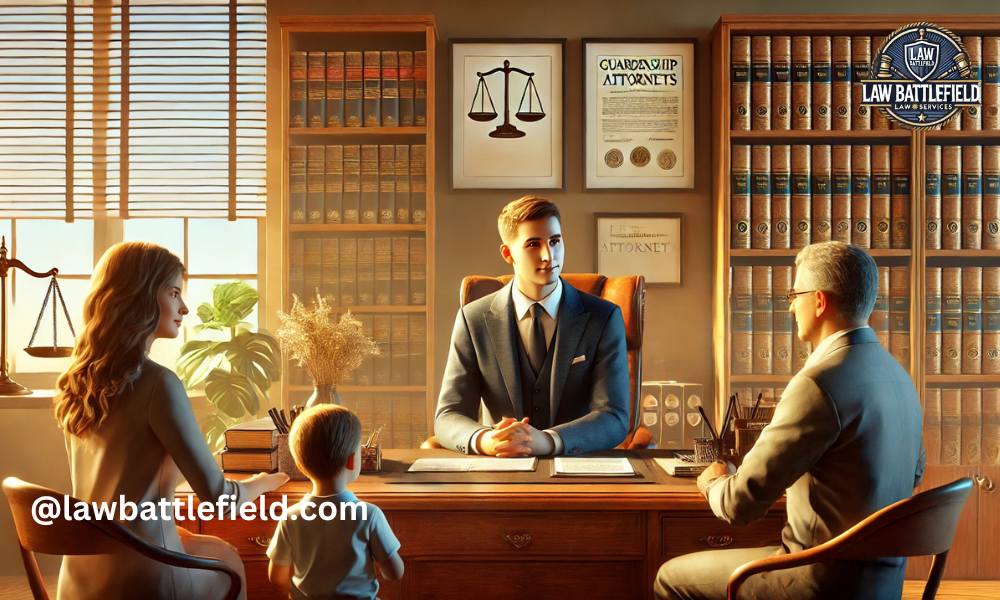Introduction To Guardianship
Definition And Purpose Of Guardianship
Guardianship is a legal arrangement where a court appoints someone to make decisions for another person. This usually happens when the person cannot make decisions on their own due to age, disability, or incapacity. The appointed person, called the guardian, is responsible for taking care of the individual’s personal, financial, and medical needs.
The main goal of guardianship is to protect individuals who cannot take care of themselves. It ensures that their rights, health, and safety are preserved. Guardianship can apply to minors, elderly adults, or people with physical or mental disabilities.
Situations Necessitating Guardianship
Guardianship becomes necessary in several situations:
- For Minors: When parents cannot care for their children due to death, illness, or incapacity. A guardian ensures the child’s well-being, education, and financial needs are met.
- For Incapacitated Adults: Elderly individuals with dementia or Alzheimer’s, adults with severe disabilities, or those in a coma may need a guardian to handle their affairs.
- For Temporary Needs: Sometimes, guardianship is needed temporarily, such as during a medical crisis or while awaiting a more permanent solution like adoption.
In each case, guardianship helps individuals get the care and support they need to live safely and with dignity.
Types of Guardianship
Guardianship Of Minors
This type of guardianship applies to children under the age of 18 who cannot be cared for by their parents. A guardian is appointed to take responsibility for the child’s well-being. This includes making decisions about education, healthcare, and daily living. Guardianship of minors is often required when parents pass away, are unable to care for their children, or are deemed unfit due to legal or personal reasons.
The goal of this guardianship is to provide a stable and nurturing environment for the child. The guardian ensures that the child’s basic needs, education, and emotional support are met.
Guardianship Of Incapacitated Adults
Guardianship of incapacitated adults is for individuals who cannot manage their affairs due to physical or mental disabilities. This can include elderly individuals with dementia, people with developmental disabilities, or adults who are temporarily incapacitated due to illness or injury.
The guardian is responsible for making decisions about healthcare, housing, and financial matters. They act in the best interests of the incapacitated person to ensure their safety and well-being.
Temporary vs. Permanent Guardianship
Temporary Guardianship
Temporary guardianship is short-term and often used in emergency situations. For example, if parents are temporarily unable to care for their child due to illness, a guardian can be appointed for a limited time. This type of guardianship ends when the need no longer exists or when the court decides it is no longer necessary.
Permanent Guardianship
Permanent guardianship is long-term and applies when there is no reasonable expectation that the person will regain the ability to care for themselves. This is common for minors whose parents are deceased or adults with lifelong disabilities. Permanent guardianship remains in place until the court decides otherwise or the ward no longer needs it.
Each type of guardianship is tailored to meet the specific needs of the individual requiring care, ensuring they receive the support and protection they deserve.
Legal Framework Governing Guardianship
Overview Of Relevant Laws And Statutes
Guardianship laws vary by state or country, but they are designed to protect individuals who cannot make decisions for themselves. Courts play a significant role in guardianship cases, ensuring that the appointed guardian acts in the best interest of the individual, also known as the ward.
Key elements of guardianship laws include:
- Court Oversight: A judge reviews the case to determine if guardianship is necessary and appoints a suitable guardian.
- Eligibility of Guardians: The law specifies who can be a guardian, often prioritizing close family members.
- Duties and Responsibilities: Guardians are legally obligated to act in the best interest of the ward, providing care, managing finances, and making decisions regarding health and living arrangements.
- Annual Reporting: Guardians may need to submit reports to the court, detailing the ward’s condition and how their needs are being met.
These laws aim to balance the ward’s rights and freedoms with the need for protection and care.
Differences Between Guardianship And Conservatorship
Guardianship and conservatorship are often confused but serve different purposes:
- Guardianship: Focuses on personal care and well-being. Guardians make decisions about healthcare, living arrangements, and daily needs. For example, a guardian might decide where the ward will live or which medical treatments they will receive.
- Conservatorship: Deals with financial matters. Conservators manage the ward’s finances, pay bills, and handle property or investments. For instance, a conservator may ensure that the ward’s savings are properly managed to cover their living expenses.
In some cases, a single individual may serve as both guardian and conservator. In others, the roles are divided to ensure specialized attention to personal and financial matters. Understanding these differences helps families and courts make informed decisions about the type of support an individual requires.
Role And Responsibilities Of Guardianship Attorneys
Guardianship attorneys play a crucial role in navigating the legal complexities of guardianship cases. They provide guidance and representation to families, guardians, and wards, ensuring that legal processes are followed correctly and rights are protected.
Assisting In Establishing Guardianship
Guardianship attorneys help clients initiate the process of establishing guardianship. This includes:
- Filing Legal Petitions: Attorneys prepare and file the necessary documents with the court to request guardianship.
- Gathering Evidence: They assist in collecting medical records, financial information, or other evidence required to prove that guardianship is necessary.
- Representation in Hearings: Attorneys represent their clients during court hearings, advocating for the best interests of the proposed ward and ensuring all legal requirements are met.
Their expertise ensures that the process is smooth, reducing delays and potential legal challenges.
Representing Wards And Guardians In Court
Guardianship attorneys provide legal representation to both wards and guardians in court proceedings. Their responsibilities include:
- Advocating for Wards: They protect the rights of the ward, ensuring that guardianship decisions serve their best interests.
- Defending Guardians: If a guardian faces disputes or allegations of misconduct, the attorney represents them, offering legal defense and guidance.
- Handling Disputes: Attorneys mediate conflicts between family members or other parties to resolve disagreements about guardianship arrangements.
Having a legal advocate ensures fair treatment and compliance with the law throughout the guardianship process.
Advising On Rights And Obligations
Guardianship attorneys educate clients about their rights and responsibilities. This includes:
- For Guardians: They provide guidance on fulfilling legal obligations, such as financial management, reporting to the court, and ensuring the ward’s well-being.
- For Wards: Attorneys ensure that wards understand their rights, such as the right to respectful treatment, appropriate care, and legal protection from abuse or neglect.
- Legal Compliance: They help guardians stay compliant with court orders and legal requirements, minimizing the risk of penalties or removal.
By offering sound advice and support, guardianship attorneys help their clients make informed decisions and navigate the guardianship process with confidence. Their expertise ensures that the guardianship arrangement serves the ward’s best interests while complying with the law.
The Guardianship Process
The guardianship process involves several steps, from initiating a petition to the appointment of a guardian. It is designed to ensure that the ward’s best interests are met while protecting their legal rights.
Initiating A Guardianship Petition
The process begins with filing a formal petition in court. This step includes:
- Filing Legal Documents: The petitioner, usually a family member or concerned party, files a guardianship petition in the appropriate court. This document outlines why guardianship is needed and provides details about the proposed guardian.
- Providing Supporting Evidence: Medical records, financial statements, or other documentation may be required to demonstrate the ward’s inability to manage their own affairs.
- Notification to Interested Parties: The petitioner must inform all relevant parties, such as family members or close associates, about the guardianship request. This ensures transparency and gives others the opportunity to object if necessary.
Proper filing and documentation are critical to avoiding delays or complications.
Court Procedures And Hearings
Once the petition is filed, the court oversees the guardianship process through a series of hearings and evaluations:
- Evaluation of the Ward: The court may appoint medical or psychological professionals to assess the ward’s capacity and needs.
- Hearing Evidence: Both the petitioner and any opposing parties present their case in court. Evidence and witness testimonies are reviewed to determine the necessity of guardianship.
- Decision by the Judge: After reviewing all evidence, the judge decides whether guardianship is required and if the proposed guardian is suitable.
The court ensures that all decisions align with the ward’s best interests and legal rights.
Appointment Of Guardians And Their Duties
If the court approves the petition, it officially appoints a guardian. The appointed guardian has specific duties and responsibilities, including:
- Personal Care: Ensuring the ward has access to adequate food, clothing, medical care, and a safe living environment.
- Financial Management: Handling the ward’s finances, such as paying bills, managing assets, and ensuring financial stability.
- Reporting to the Court: Guardians are often required to provide periodic updates to the court, detailing how the ward’s needs are being met and how funds are being used.
The court monitors the guardian’s actions to prevent abuse or neglect and may intervene if issues arise. This structured process ensures that guardianship arrangements are fair, lawful, and beneficial for the ward.
Rights Of The Ward
The rights of the ward are central to any guardianship arrangement. Courts and guardians must ensure these rights are respected and upheld throughout the guardianship process. Safeguarding these rights promotes dignity, safety, and fairness for the ward.
Ensuring The Ward’s Best Interests
The primary goal of guardianship is to act in the ward’s best interests. This includes:
- Personal Care: Ensuring the ward has access to proper healthcare, nutritious food, safe housing, and emotional support.
- Respect for Preferences: Whenever possible, the ward’s preferences regarding their living arrangements, medical care, and daily activities should be considered.
- Freedom from Exploitation: Guardians must protect the ward from financial exploitation, abuse, or neglect.
By focusing on the ward’s well-being, guardians and courts help them maintain a good quality of life.
Legal Protections And Advocacy
Wards have specific legal rights, even when under guardianship. These protections include:
- Right to Respectful Treatment: The ward has the right to be treated with dignity, respect, and compassion by their guardian and others involved in their care.
- Right to Advocacy: If a ward feels their guardian is not acting in their best interests, they can seek legal representation or assistance from court-appointed advocates.
- Right to Challenge the Guardianship: Wards can challenge the terms of their guardianship or request a change in their guardian if they believe their rights are being violated.
- Periodic Court Reviews: Courts regularly review guardianship arrangements to ensure they remain appropriate. This oversight protects the ward from potential misuse of authority by the guardian.
These rights ensure that guardianship does not strip the ward of their autonomy or subject them to unnecessary control. Legal protections safeguard the ward’s well-being, emphasizing that guardianship exists to serve and support them, not limit their fundamental freedoms.
Alternatives To Guardianship
Guardianship can be a necessary solution in some cases, but it is not always the best or only option. Alternatives to guardianship allow individuals to retain more control over their lives while still receiving the support they need. These options are often less restrictive and promote autonomy.
Power Of Attorney
A power of attorney (POA) allows an individual, called the principal, to appoint someone they trust, called an agent, to make decisions on their behalf. This alternative is commonly used for financial or healthcare matters.
- Financial Power of Attorney: The agent manages the principal’s finances, such as paying bills, handling investments, or managing property.
- Healthcare Power of Attorney: The agent makes medical decisions based on the principal’s wishes.
POA agreements are flexible and can be customized to cover specific needs. They are ideal for individuals who can make informed decisions but want a trusted person to assist in certain areas.
Supported Decision-Making
Supported decision-making is a collaborative process where individuals with disabilities or impairments receive assistance to make their own decisions. Instead of transferring decision-making power to a guardian, this approach provides guidance and resources.
- How It Works: The individual retains full legal control over their decisions but consults with trusted supporters for advice or information.
- Benefits: Supported decision-making fosters independence and self-determination, allowing the person to maintain their autonomy.
This model is often used for adults with developmental disabilities or mild cognitive impairments who need some help navigating complex choices.
Advance Directives
Advance directives are legal documents that outline an individual’s preferences for healthcare and end-of-life care. These documents ensure that their wishes are respected if they become unable to communicate or make decisions.
- Living Will: Specifies medical treatments the individual wants or does not want, such as life support or resuscitation.
- Healthcare Proxy: Appoints someone to make healthcare decisions if the individual becomes incapacitated.
Advance directives give individuals control over their future care and reduce the need for guardianship in medical situations.
Challenges And Considerations In Guardianship
Guardianship, while essential in many cases, comes with challenges and responsibilities that must be carefully managed. Understanding the ethical concerns and the need for proper oversight ensures that the system serves its intended purpose without harm.
Ethical Concerns And Potential For Abuse
Guardianship places significant power in the hands of the guardian, which can sometimes lead to ethical dilemmas or misuse of authority. Common concerns include:
- Loss of Autonomy: Wards may feel they have lost control over their lives, leading to frustration or a sense of helplessness.
- Financial Exploitation: In some cases, guardians misuse the ward’s funds or assets for personal gain instead of the ward’s benefit.
- Neglect or Mistreatment: A guardian may fail to meet the ward’s needs, either due to negligence or lack of understanding.
Addressing these concerns requires a balance between providing care and respecting the ward’s independence. Ethical guardianship ensures that the ward’s dignity and rights remain a priority.
Monitoring And Oversight Mechanisms
To prevent abuse and ensure accountability, courts and legal systems implement monitoring and oversight mechanisms:
- Court Supervision: Guardians are often required to submit periodic reports to the court. These reports detail the ward’s condition, financial expenditures, and how their needs are being met.
- Audits: Financial management by the guardian may be subject to audits to ensure transparency and prevent misuse of funds.
- Complaint Systems: Wards, family members, or concerned parties can report suspected abuse or neglect. Courts or advocacy organizations investigate these complaints and take action if necessary.
- Regular Reviews: Courts may schedule periodic reviews of the guardianship arrangement to determine if it is still necessary or if changes are needed.
These mechanisms aim to protect wards from harm and ensure that guardians fulfill their responsibilities with integrity and care.
Recent Developments And Reforms In Guardianship Law
Guardianship laws have evolved to better protect individuals who cannot care for themselves. Recent changes focus on enhancing rights, preventing abuse, and promoting less restrictive alternatives.
Notable Case Studies And Legal Precedents
High-profile cases have highlighted issues within the guardianship system, leading to significant legal precedents:
- Britney Spears Case: The prolonged conservatorship of pop star Britney Spears brought global attention to potential abuses in guardianship arrangements. Her legal battle underscored the need for reforms to protect individuals from unwarranted control over their personal and financial affairs.
- In re Guardianship of Kowalski: This landmark case involved Sharon Kowalski, who became incapacitated after an accident. Her partner, Karen Thompson, fought a lengthy legal battle against Kowalski’s parents for guardianship rights. The court’s decision to appoint Thompson as guardian was a significant step in recognizing the rights of same-sex partners in guardianship cases.
These cases have spurred discussions and reforms aimed at safeguarding the rights of those under guardianship.
Legislative Changes And Their Implications
Recent legislative efforts have aimed to improve the guardianship system:
- Guardianship Bill of Rights: In August 2023, the American Bar Association adopted a policy urging the adoption of the Guardianship Bill of Rights. This initiative emphasizes due process and aims to protect individuals from potential abuses in guardianship proceedings.
- State-Level Reforms: States like Pennsylvania have enacted laws to make guardianship a last resort, encouraging alternatives like supported decision-making. These reforms aim to preserve individual autonomy while providing necessary support.
These legislative changes reflect a growing commitment to protecting the rights and dignity of individuals in guardianship arrangements.
Ongoing reforms and increased awareness continue to shape a more just and equitable guardianship system.
Selecting A Qualified Guardianship Attorney
Choosing the right guardianship attorney is a critical step in navigating the complexities of guardianship law. A qualified attorney can provide the expertise and support needed to protect the ward’s best interests and ensure legal compliance.
Essential Qualifications And Experience
When selecting a guardianship attorney, consider their qualifications and experience:
- Specialization in Guardianship Law: Attorneys with a focus on guardianship cases have a deep understanding of the legal framework and challenges involved.
- Relevant Experience: Look for attorneys who have successfully handled cases similar to yours, whether it involves minors, incapacitated adults, or disputes.
- Knowledge of Local Laws: Guardianship laws vary by state or jurisdiction. An attorney familiar with local regulations is better equipped to handle your case effectively.
- Reputation and Reviews: Research the attorney’s reputation through online reviews, referrals, or testimonials from past clients.
Selecting an experienced and reputable attorney ensures competent legal guidance throughout the process.
Questions To Ask Prospective Attorneys
Before hiring an attorney, ask the following questions to assess their suitability:
- What is your experience with guardianship cases?
This helps you understand their familiarity with similar situations. - What is your approach to resolving disputes?
Some cases involve family disagreements, so it’s important to know how the attorney handles conflict. - How do you charge for your services?
Understanding the fee structure ensures transparency and avoids surprises. - What can I expect from the guardianship process?
A good attorney will provide a clear roadmap and realistic expectations. - Do you have references from past clients?
Speaking to previous clients can provide valuable insights into the attorney’s professionalism and effectiveness.
Importance Of Specialized Legal Representation
Guardianship cases can be emotionally and legally complex. Specialized legal representation is essential for:
- Ensuring Compliance: An experienced attorney ensures that all legal requirements are met, reducing the risk of delays or complications.
- Protecting Rights: They advocate for the ward’s rights and best interests, balancing care with legal obligations.
- Managing Complexities: From court hearings to documentation, specialized attorneys handle the intricacies of the process, allowing you to focus on the well-being of the ward.
Hiring a qualified guardianship attorney provides peace of mind, knowing that your case is in capable hands and that the ward’s needs and rights are prioritized.
Conclusion
Recap Of Key Points
Guardianship is a legal process designed to protect individuals who cannot care for themselves. It involves appointing a guardian to manage personal, financial, or healthcare decisions. Understanding the types of guardianship, the legal framework, and the responsibilities of guardianship attorneys is crucial for navigating this complex area of law.
We explored:
- The types of guardianship, including for minors, incapacitated adults, and temporary or permanent arrangements.
- The legal framework, emphasizing the importance of court oversight and the distinction between guardianship and conservatorship.
- The critical role of guardianship attorneys, from establishing guardianship to providing legal representation and advice.
- The process of guardianship, which includes filing petitions, attending court hearings, and fulfilling guardian duties.
- Alternatives like power of attorney and supported decision-making, which promote autonomy and less restrictive solutions.
- Challenges such as ethical concerns and abuse, highlighting the need for proper monitoring and oversight.
- Recent developments in guardianship law, showcasing reforms aimed at protecting wards’ rights and improving the system.
- Tips for selecting a qualified guardianship attorney, ensuring expertise and trust in handling these sensitive cases.
Importance Of Informed Decision-Making In Guardianship Matters
Making informed decisions is vital in guardianship matters. Whether you’re pursuing guardianship, exploring alternatives, or choosing an attorney, understanding the process and its implications ensures better outcomes for everyone involved.
Guardianship is more than a legal process; it is a responsibility that impacts lives deeply. Acting with care, knowledge, and integrity ensures that the ward’s rights, dignity, and well-being remain the top priority.
Frequently Asked Questions (FAQs)
1. What Does A Guardianship Attorney Do?
A guardianship attorney helps establish and manage guardianships by filing petitions, representing clients in court, and providing legal advice. They ensure the process complies with the law and advocate for the ward’s best interests.
2. Who Can Be Appointed As A Guardian?
Typically, close family members or trusted individuals can be appointed as guardians. The court evaluates the suitability of the proposed guardian to ensure they can fulfill the responsibilities.
3. How Long Does The Guardianship Process Take?
The timeline varies depending on the complexity of the case and court schedules. It can take a few weeks to several months to complete the process.
4. What Are Alternatives To Guardianship?
Alternatives include power of attorney, supported decision-making, and advance directives. These options allow individuals to maintain more control while receiving assistance.
5. Can Guardianship Be Challenged Or Revoked?
Yes, guardianship can be challenged if it is no longer necessary or if the guardian is not fulfilling their duties. The court reviews such requests to ensure the ward’s best interests are protected.
6. How Much Does It Cost To Hire A Guardianship Attorney?
Costs vary based on the attorney’s experience, the complexity of the case, and the location. Many attorneys offer consultations to discuss fees upfront.
7. What Rights Does A Ward Retain Under Guardianship?
Wards retain fundamental rights, such as the right to be treated with dignity and respect. Depending on the type of guardianship, they may also retain the ability to make certain decisions independently.
8. Can A Guardianship Attorney Assist With Disputes?
Yes, guardianship attorneys help resolve disputes between family members or other parties regarding guardianship arrangements, ensuring that the ward’s best interests are prioritized.
Was this article helpful? Check out more on Lawbattlefield.com
Ismail Kolya Divorce: Insights Into His Life, Career, And Public Curiosity





